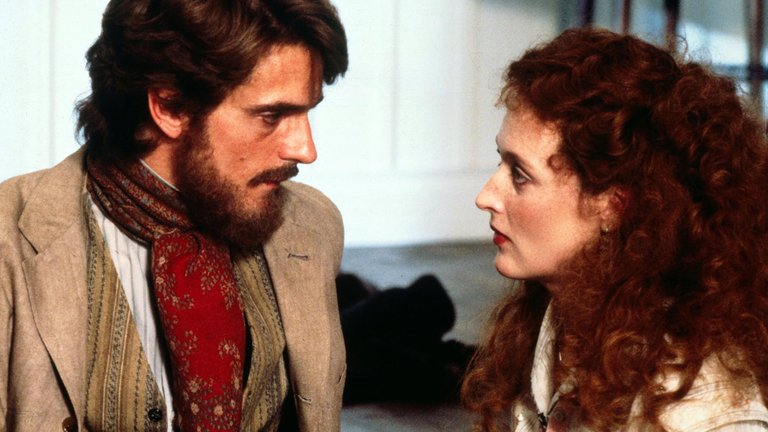Retro Film Review: The French Lieutenant's Woman (1981)

One of the hardest tasks for any filmmaker is a successful adaptation of a literary classic. There were very few of them who actually succeeded in that and rarely do we see great novels being transformed into great films. The reason is quite obvious – the medium of movie is quite different from the film and thousands of pages of text could hardly be transformed into two hours or 90 minutes of films. So, film adaptations could hardly be faithful to the original novels and fans of such novels are almost always disappointed. On the other hand, in such cases ignorance could be bliss. By not reading the original novel in advance, viewers are spared from such disappointments and they can judge movie based on its own merit. For the author of this review, such was the case with John Fowles' novel The French Lieutenant's Woman and its 1981 film adaptation by Karel Reisz.
The plot begins when Victorian gentleman and amateur scientist Charles Smithson (played by Jeremy Irons) comes from London to coastal town of Lyme in order to study fossils. During his stay, he is engaged to Ernestina Freeman (played by Lynsey Baxter), daughter of wealthy local industrialist. Before two of them get married, Charles meets Sarah Woodruff (played by Meryl Streep), ex-governess who became scorned by the local community after the torrid affair with French seaman. Some call her "whore", some pity her, and some, like local physician Doctor Grogan (played by Leo McKern) doubt her sanity since she spends every free moment looking at the sea. Charles is intrigued by her story and wants to help her, but in the process he falls in love and endangers his own engagement and future with Ernestina. Sarah also seems to fall in love with Charles, but some of her actions indicate clever manipulation. In the same time, Mike and Anna, modern day actors who play characters of Charles and Sarah in the movie based on the novel, have their own torrid love affair on the set.
Faithful adaptation of The French Lieutenant's Woman, according to those who had read the novel, was impossible, so the authors of this movie had to be creative. Director Karel Reisz was lucky to have script written by famous British playwright Harold Pinter. Instead of standard plot, we have two parallel stories - regular and "movie within movie". The latter is given more time, but the lack of usual suspension of disbelief (since we know from the start that we are watching the film, and not the actual story or characters) doesn't hurt the film. Instead, those two parallel plots help us to truly appreciate the film and directorial mastery of Karel Reisz. The editing, very important in this kind of film, is well done. Although the modern segment is given less time than Victorian "movie within movie", Reisz uses small bits and pieces to paint complex and intriguing picture. Two love stories are very different and very similar in both times; characters are complex, and their motivations unclear, and the outcomes for protagonists are different. Reisz and Pinter also use parallel stories to comment on differences between modern and Victorian times in the way society treated women, marriage, sexual morality and mental illness. And even "movie within movie" has few well-done ingredients to the story - character of Charles' young servant Sam (played by Hilton McRae) and his romance with local girl is good opportunity to portray class division in Victorian society.
Such complex story and dual characters required first class actors in major roles. Jeremy Irons in his first major role fulfilled that requirement, but his portrayal of nice, mild-mannered Victorian gentleman who gets in trouble because he can't control his romantic desires doesn't look impressive. But it didn't happen because Irons was bad in his role; on the contrary, he is as good as ever, but in the view of the similar roles he played in many recent movies, his Charles/Mike doesn't look original. Unlike somewhat typecast Irons, his more versatile partner Meryl Streep is truly great, although her Sarah seems much more interesting character than Anna. The other actors are also great, especially Leo McKern in memorable episode of local physician who takes interest in uncharted areas of psychiatry. Reisz also took great efforts to reconstruct period details, and always reliable composer Carl Davis creates melancholic atmosphere with his musical score, dominated by string instruments. The ending of the film is somewhat overlong and confusing, though. But that wouldn't general impression about The French Lieutenant's Woman as surprisingly successful combination of standard melodrama and unconventional filmmaking.
RATING: 8/10 (+++)
(Note: The text in its original form was posted in Usenet newsgroup rec.arts.movies.reviews on February 23rd 2000)
==
Blog in Croatian https://draxblog.com
Blog in English https://draxreview.wordpress.com/
Cent profile https://beta.cent.co/@drax
Minds profile https://www.minds.com/drax_rp_nc
Brave browser: https://brave.com/dra011
BTC donations: 1EWxiMiP6iiG9rger3NuUSd6HByaxQWafG
ETH donations: 0xB305F144323b99e6f8b1d66f5D7DE78B498C32A7
Movie URL: https://www.themoviedb.org/movie/12537-the-french-lieutenant-s-woman
Critic: AAA